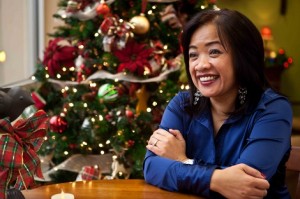Christmas Around the World is a 10-part series. This audio podcast is narrated by Mila (pronounced Mee La) Romine who grew up south of Manila in Bicol, Philippines. She has been living in the United States for the last 16 years.
Podcast: Download (Duration: 3:59 — 5.5MB)
Mila Romine: Christmas in the Philippines, one of two predominantly Catholic countries in Asia, the other one being East Timor, is one of the biggest holidays on the calendar and is widely celebrated.
The season is traditionally ushered in by the nine-day dawn masses that start on December 16, known as the Misas de Aguinaldo (Gift Masses), or Misa de Gallo (Rooster’s Mass) in the traditional Spanish. These masses are more popularly known in Tagalog as the Simbang Gabi. Usually, other days in close proximity such as Christmas Eve (December 24), Día de los Santos Inocentes (December 28), and the Epiphany on the first Sunday of January, are also declared non-working days.
As in many East Asian countries, secular Christmas displays are common both in business establishments and in public, including lights, Christmas trees, depictions of Santa Claus (despite the tropical climate), and Christmas greetings in English and various Philippine languages and dialects.
For Filipinos, Christmas Eve (Tagalog: Bisperas ng Pasko; Spanish: Víspera del Día de Navidad) is celebrated with the Midnight Mass. And immediately after the traditional Christmas Eve feast, family members dine together around 12 midnight on traditional Nochebuena fare, which may include: queso de bola (Spanish: “ball of cheese”; this is actually edam cheese), Tsokolate (a hot chocolate drink), and jamón (Christmas ham), lechón, queso de bola, roast chicken or turkey pasta relleno (stuffed bangus or chicken), pan de sal, and various desserts including cakes and the ubiquitous fruit salad. Some would also open presents at this time.
Christmas officially ends on the Feast of the Three Kings (Tres Reyes in Spanish or Tatlong Hari in Tagalog), also known as the Feast of the Epiphany (Spanish: Fiesta de Epifanía).
The Feast of the Three Kings was celebrated on the first Sunday after the New Year. Some children leave their shoes out, in the belief that the Three Kings will leave gifts like candy or money inside.
The final salvo of these celebrations is marked by the feast of the Black Nazarene every January 9 in Manila, but can even extend till the final weeks of that month.
CREDITS
Audio captured and edited by Ed Stortro
Audio transcription by Ed Stortro
Voice over Mila Romine










